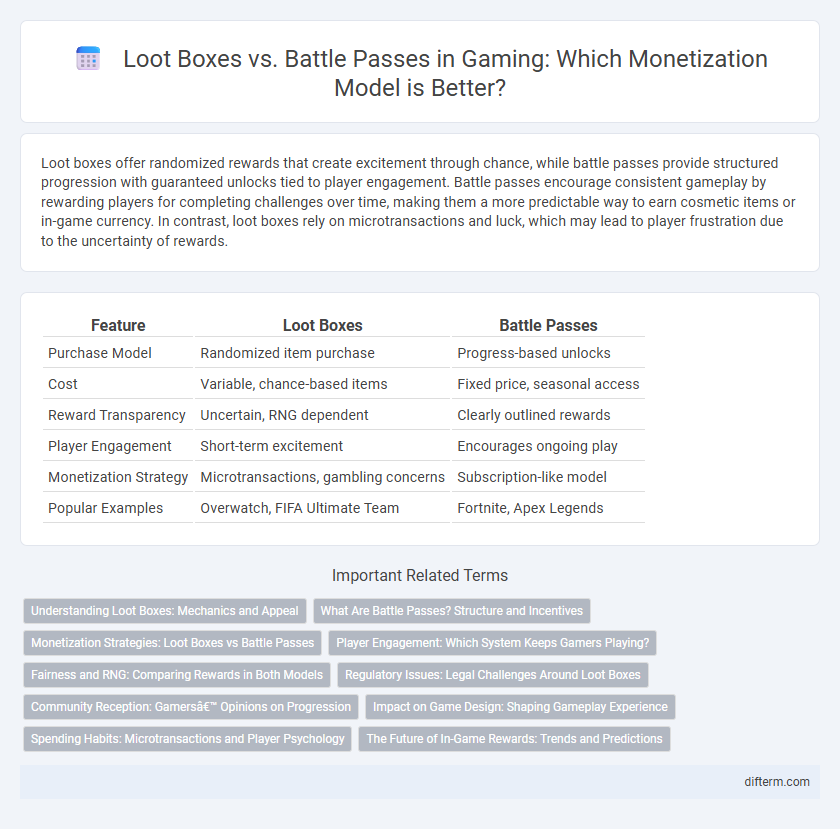Loot boxes offer randomized rewards that create excitement through chance, while battle passes provide structured progression with guaranteed unlocks tied to player engagement. Battle passes encourage consistent gameplay by rewarding players for completing challenges over time, making them a more predictable way to earn cosmetic items or in-game currency. In contrast, loot boxes rely on microtransactions and luck, which may lead to player frustration due to the uncertainty of rewards.
Table of Comparison
| Feature | Loot Boxes | Battle Passes |
|---|---|---|
| Purchase Model | Randomized item purchase | Progress-based unlocks |
| Cost | Variable, chance-based items | Fixed price, seasonal access |
| Reward Transparency | Uncertain, RNG dependent | Clearly outlined rewards |
| Player Engagement | Short-term excitement | Encourages ongoing play |
| Monetization Strategy | Microtransactions, gambling concerns | Subscription-like model |
| Popular Examples | Overwatch, FIFA Ultimate Team | Fortnite, Apex Legends |
Understanding Loot Boxes: Mechanics and Appeal
Loot boxes offer randomized rewards, creating a sense of excitement and unpredictability that appeals to players seeking instant gratification. Their mechanics rely on chance, often encouraging repeated purchases to obtain rare items or cosmetics. This gamble-like system contrasts with battle passes, which provide a clear progression path through tiered rewards earned by gameplay.
What Are Battle Passes? Structure and Incentives
Battle passes are progressive reward systems in gaming that grant players exclusive items, cosmetics, and in-game currency by completing challenges and earning experience points. Structured in tiers, battle passes encourage continuous engagement through time-limited seasons, offering both free and premium tracks with escalating incentives. This design motivates players to invest time and potentially money to unlock unique content not available through traditional loot boxes.
Monetization Strategies: Loot Boxes vs Battle Passes
Loot boxes generate revenue through randomized rewards, encouraging frequent purchases with the appeal of chance, while battle passes offer fixed, tiered content that unlocks progressively based on player engagement. Battle passes promote longer-term player retention by providing clear goals and exclusive cosmetics tied to gameplay milestones, contrasting with loot boxes' reliance on gambling-like mechanics that face regulatory scrutiny. Both strategies monetize player investment but differ in transparency and player satisfaction, with battle passes increasingly favored for sustainable revenue and community trust.
Player Engagement: Which System Keeps Gamers Playing?
Battle passes drive sustained player engagement by offering a clear progression system with unlockable rewards tied to gameplay milestones, encouraging regular play sessions. Loot boxes rely on random chance for rewards, which can create short bursts of excitement but often lead to player frustration and decreased long-term involvement. Data from games like Fortnite and Apex Legends show higher retention rates and consistent daily active users with battle pass models compared to loot box-focused titles.
Fairness and RNG: Comparing Rewards in Both Models
Loot boxes rely heavily on random number generation (RNG), creating unpredictable reward outcomes that can lead to perceived unfairness and potential pay-to-win scenarios. Battle passes offer a more transparent and structured progression system, ensuring players receive specific rewards through achievable milestones without RNG interference. This model promotes fairness by allowing players to plan and earn items through consistent gameplay rather than chance.
Regulatory Issues: Legal Challenges Around Loot Boxes
Loot boxes face intense regulatory scrutiny due to their resemblance to gambling, with countries like Belgium and the Netherlands enforcing bans or strict restrictions. Legal challenges center on consumer protection, especially regarding minors' exposure to randomized rewards and potential financial harm. Battle passes are typically viewed as more transparent and fair, reducing regulatory risks by offering predictable, non-randomized content progression.
Community Reception: Gamers’ Opinions on Progression
Loot boxes often face criticism from gamers due to their randomized rewards, which can feel unfair and lead to pay-to-win dynamics, sparking debates about gambling-like mechanics in gaming. Battle passes receive a more positive community reception as they offer transparent, progression-based rewards that encourage skill and consistent play, providing clear value for investment over time. Gamers generally favor battle passes for their fairness and structured progression, enhancing engagement without relying on chance.
Impact on Game Design: Shaping Gameplay Experience
Loot boxes create unpredictability in gameplay by offering random rewards that can alter player progression and engagement, often leading developers to design around monetization rather than balanced challenges. Battle passes provide a structured reward system with clear progression, encouraging consistent play and enabling designers to craft content that aligns with skill development and seasonal themes. This shift fosters a more transparent and goal-oriented experience, influencing game pacing and player motivation.
Spending Habits: Microtransactions and Player Psychology
Spending habits in gaming reveal distinct player psychology driving microtransactions through loot boxes and battle passes. Loot boxes exploit random reward mechanisms, triggering dopamine responses that encourage repeated purchases despite uncertain outcomes. In contrast, battle passes offer transparent value progression, fostering sustained engagement by rewarding consistent play with predictable, tier-based content.
The Future of In-Game Rewards: Trends and Predictions
The future of in-game rewards is shifting from loot boxes to battle passes, emphasizing player engagement and value through tiered content and guaranteed rewards. Battle passes drive consistent gameplay and offer transparent progression systems, reducing regulatory concerns linked to loot boxes' gambling mechanics. Emerging trends point towards personalized rewards and integration of blockchain technology, enhancing ownership and monetization in virtual economies.
loot boxes vs battle passes Infographic

 difterm.com
difterm.com